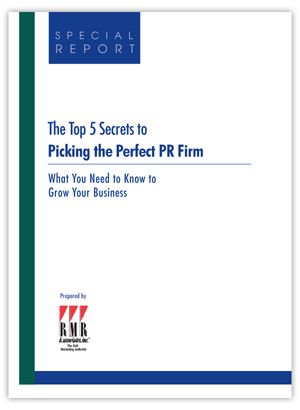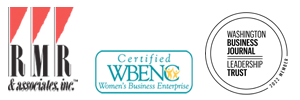The Top 5 Secrets to Picking the Perfect PR Firm
By Robyn Sachs, President and CEO of RMR & Associates
If you’re looking for new ways to grow your business – and who isn’t? – it’s smart to turn to a public relations firm. The right PR firm can devise a strategic, integrated plan that maximizes your resources to give you the best return on your financial investment. But PR firms are not all the same. Some specialize in certain industries. Some may not have the right media contacts for your business. So how do you know what you’re really getting?
The secret is to ask the right questions up front. By putting the same questions to each firm you’re considering, you’ll be able to compare what each offers and determine which one is the best fit for your business.
Start by asking yourself these two important questions:
1. What do I expect a PR firm to accomplish?
Most people say “I want to have a successful PR campaign.” But everyone defines success differently. What does ‘a successful PR campaign’ mean to you? A year from now, what would it take for you to say your PR efforts were a success? For some people, it’s a defined number of qualified leads. For others, it’s a certain number of speaking engagements or doubling the number of articles written about their company and placed in their industry’s trade journals.
Chances are, not everyone on your management team will agree on what a successful PR campaign means. A marketing director is likely to have quite a different definition than a CEO. Talk with your decision makers and come to a consensus on what you want to achieve so you can share your goals with the PR firms you interview.
Expect a good PR firm to ask you this question, and be prepared with your answer. They should then discuss how realistic your expectations are, and how they would meet them. In fact, if a firm doesn’t have this discussion with you, what success looks like, consider that a red flag and move on.
2. What is my budget for PR?
Just as you need to know how much your clients have to spend for your product or service, a PR firm needs to know your budget. An experienced PR firm knows exactly what it costs to carry out each portion of a PR campaign. Once they know your budget, they can determine the elements that can be included in your plan as well as the scope of each element.
Your budget is also a factor in deciding whether a PR firm is a good fit for your business. Ideally, your budget should fall within the range of most of their clients’ budgets. If your budget is considerably smaller, you might be better off with a PR firm that typically works with budgets that size. But bigger isn’t always better, either. If your budget is significantly larger than what the PR firm is used to handling, they may not have adequate staffing to devote to your account.
While you’re talking budgets, ask each PR firm how they bill their clients. Do they require a monthly retainer fee? Do they charge based on an hourly rate, or per project? Look for a firm that will tell you in advance what your campaign will cost, and then average that cost over 12 months. That way, in months where there is more activity, you will pay the same amount as in the less busy months. Even though more money will be needed at the start of the campaign – when deliverables are put together and meeting time is heavy – you can still budget for the average dollar amount.
Then be ready to ask each PR firm these three questions:
3. Do you have experience with businesses like mine?
If you need to have a compound fracture set, do you want the orthopedic surgeon who specializes in complex surgeries, or the generalist who tells you setting one bone is just like setting another?
That doesn’t necessarily mean the firm must have another client in your exact industry. After all, you certainly don’t want them representing you and your competitors. But they should be able to give you examples of current or previous clients whose situations were similar to yours, how they served them, and the successful outcomes.
Also look for indications that they have experience working with other businesses when they were at a similar point as your business is now. If you’re a start-up looking to be acquired by a larger company within a few years, ask if they’ve ever taken a client from start-up through acquisition. If you’re a company with a new product to promote, ask how many and what types of product rollouts they’ve done in the past.
4. What type of relationship do you have with the media my business needs to impress?
When a business is disappointed with the return on their PR investment, it’s often because their PR firm didn’t spend enough time talking to the media. You can have the most revolutionary new product to ever hit the market, but if no one knows about it, you’re not going to make many sales.
Reporters receive many more press releases and requests for coverage than they could ever read or consider. To get your business on their radar, you need a PR firm that can get through to the right editors and make a persuasive story pitch. This takes PR professionals with years of experience cultivating contacts in local media outlets, national and trade publications.
Ask potential PR firms for their track record in placing stories about their clients. To be truly successful in this area, the firm should have dedicated media specialists who spend the bulk of their time touching base with media and reporters, pitching stories for their clients. It takes unique skills to be aggressive enough to get through to the media, but also gain their trust. Editors need to know that when these media specialists call, they will have a well thought out story idea and the ability to deliver it.
5. Who will be handling my business on a daily basis?
Most firms’ new business teams are made up of dynamic, experienced, knowledgeable personnel. They’re trying to get your account, so of course they’re sending in the big guns; the firm’s best spokespeople. Possibly even their top executives. You’re impressed and feel important. Believing that you’ve established a rapport with them, you sign on their dotted line.
But guess what? With many PR firms, you’ll never see that team again because they’re busy closing the next deal. The team you work with on a daily basis may or may not have the same level of experience, enthusiasm and dedication as the team that convinced you to sign with their firm.
So before you shake hands on a new working relationship, find out who you’ll actually be working with. Who will be your primary contact? Who will run your meetings, plan schedules and answer your questions? What type of experience do these employees have?
Of course, the firm’s CEO can’t be involved in every meeting and phone call. A savvy PR firm will have hired qualified staff who are educated and well trained in the areas they will handle. But there should also be an executive level staff member who oversees your business, knows its status and ensures that stated goals are met. And you should meet and talk with the professionals who will be entrusted with your business.
Don’t assume you’ve met the team you’ll be working side-by-side with. Ask. And if you don’t like the answer, look for a PR firm that’s a better fit for you.
Armed with these 5 questions, you’ll be able to compare the PR firms you’re considering and choose the one that can best help your business conduct a successful PR campaign – one that meets and even exceeds your goals.


